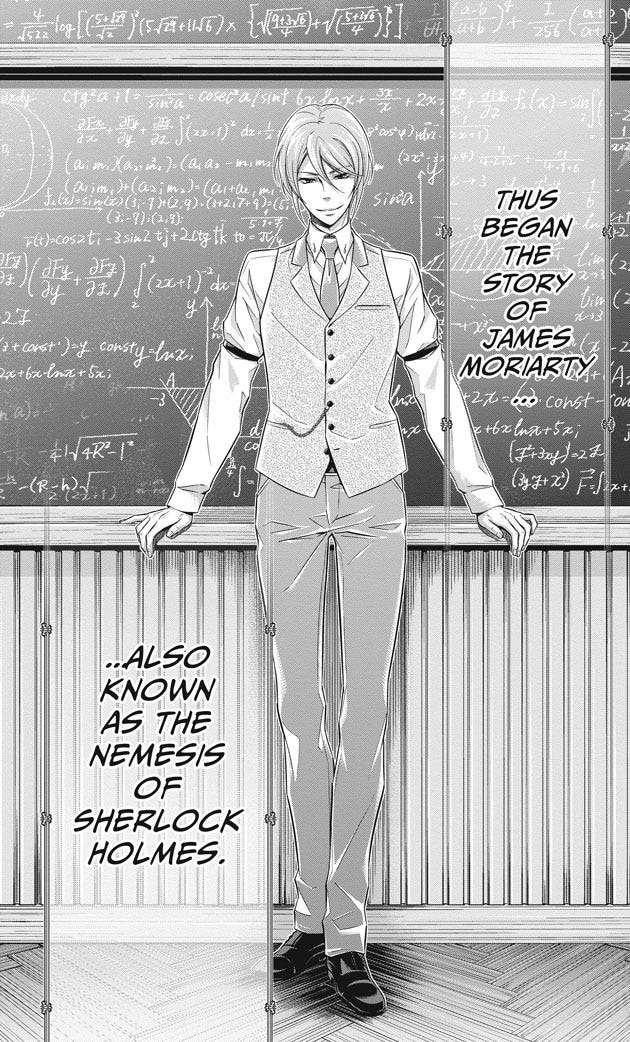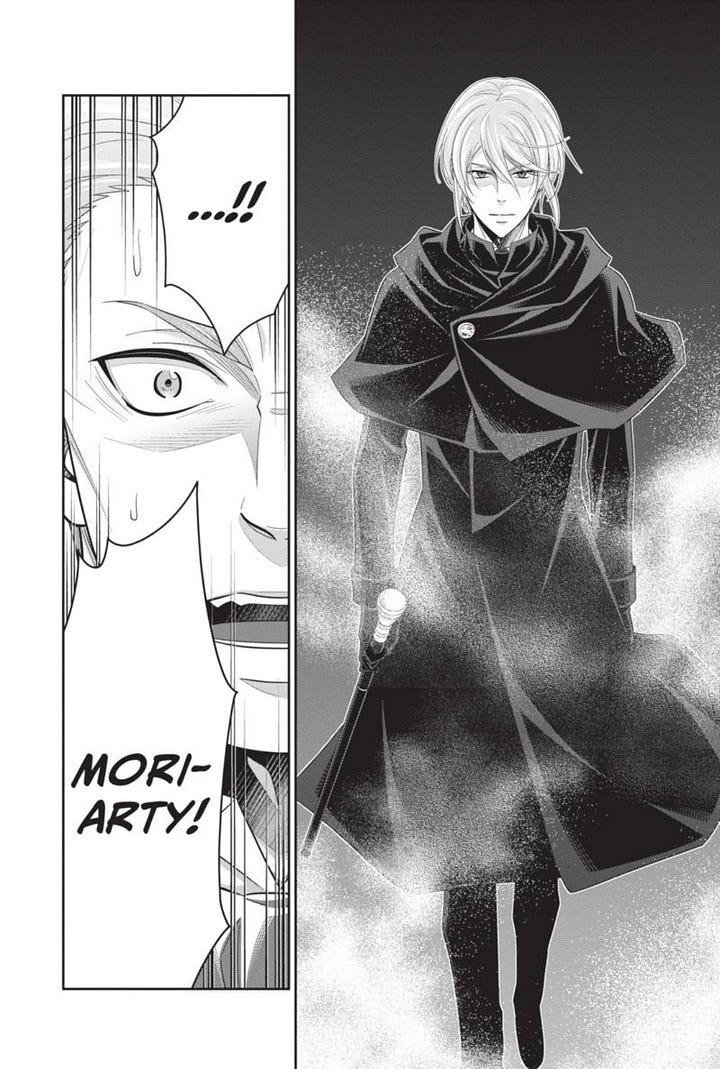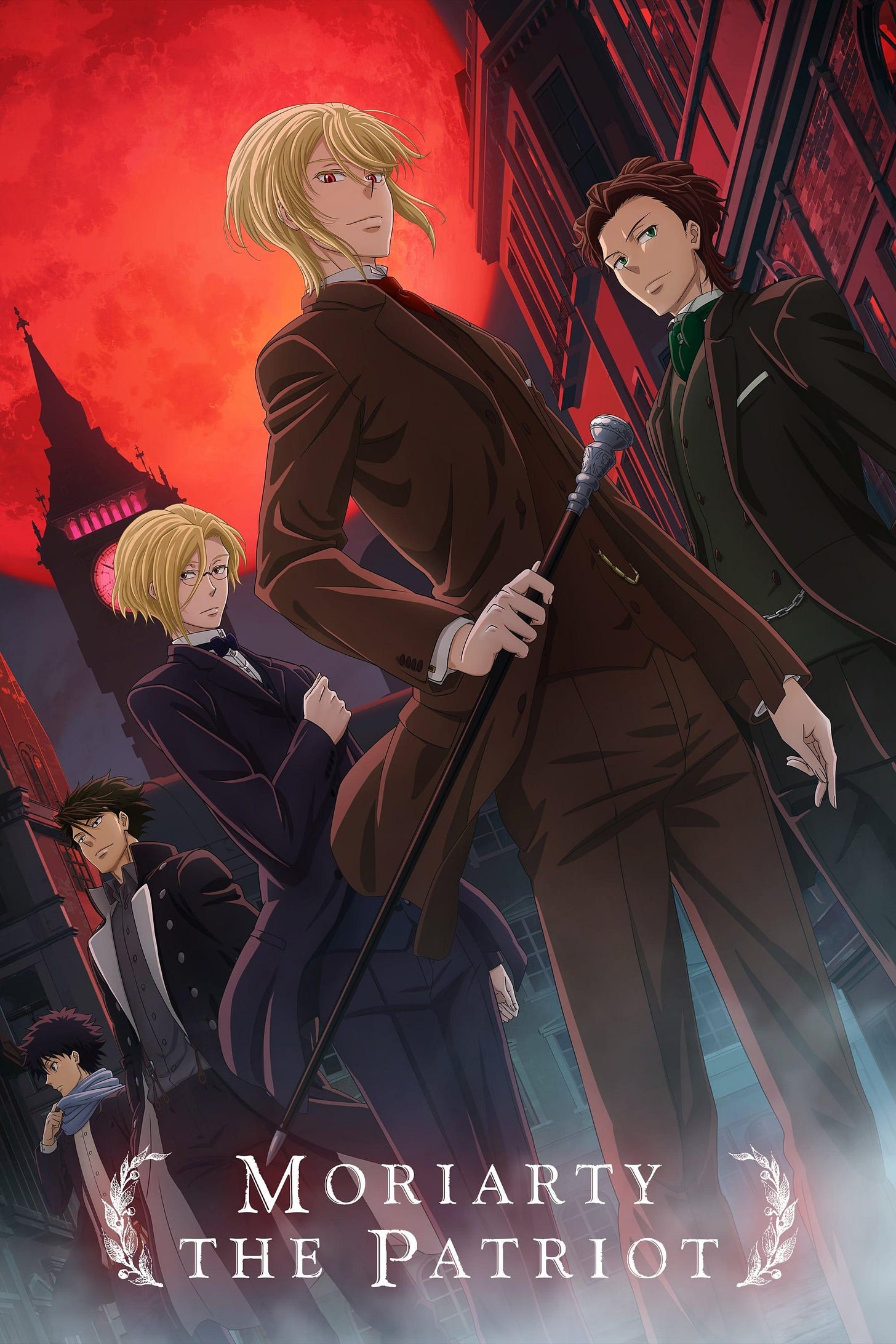Story Love, Part 3: Moriarty the Patriot
Retelling a classic in the best way possible
Welcome to my 99th newsletter! 🎈🎉🍾🥂
And the 3rd instalment of this Story Love series.
Introduction
Did you know that Sherlock Holmes holds the Guinness World Record for most portrayed human literary character in film and television? As of April 2012, he had been portrayed 224 times by more than 75 actors and there have been more than 25,000 adaptations featuring the famous detective.
This is no surprise considering the Sherlock Holmes stories are immensely adaptable. If any genre was going to take the title for most widely consumed, most loved and most adapted, it would likely be the crime and mystery genre. Detectives, as fictional characters, are extremely popular and there are countless numbers of them, each with their own unique quirks, skills and experience. Sherlock Holmes stands out because he is the World’s First Consulting Detective, a master of deduction with an impressive intellect, and also a morphine-taking, violin-playing eccentric with a flair for the dramatic and an aversion to women.
He is also one of the few fictional detectives to have an archnemesis: Professor James Moriarty—also fictionally famous in his own right. Give ‘fictional archnemeses’ a quick google and Moriarty pops up near the top of every list. It’s impressive that Moriarty has become such a well-known character considering that out of the 56 Sherlock Holmes stories and 4 novels Doyle wrote, the ‘Napoleon of Crime’ only appears in two and is only mentioned in another five.
But we love a good villain, don’t we?
An epic game of cat and mouse between The Consulting Detective and The Napoleon of Crime? What’s not to love? It’s a story we’ll probably never get sick of, no matter how many times it’s adapted and retold, over and over and over again.
There are plenty of modern versions of Doyle’s stories to indulge in, from adaptations like Granada’s television series starring Jeremy Brett, Steven Moffat’s modern-set drama, starring Benedict Cumberbatch as the ‘high-functioning sociopath’, or Guy Ritchie’s films, with Robert Downey Junior taking the lead role; to retellings, like the animation The Great Mouse Detective, the children’s programme The Adventures of Shirley Holmes, or the manga (also now an anime) Ron Kamonohashi's Forbidden Deductions.
I’ve enjoyed lots of these versions; they all have their own charm and their own take on the key characters. In most cases, Holmes and Moriarty are both depicted as brilliant but cold, calculating individuals, with inhuman qualities who just happen to be fighting on opposite sides of the law. They’re immensely fun to watch—have you seen RJD’s Sherlock? Or Andrew Stott’s Moriarty?—going head-to-head in an advanced game of chess where real people are the pawns; but to be honest, despite that, I’ve never really liked either character in any of the renditions I’ve encountered. Moriarty is simply a smug, creepy criminal-genius, and Sherlock, honestly, is not much better.
So, when I came across Moriarty the Patriot, I wasn’t expecting anything other than yet more smug geniuses, going at their little mind games, anime style.
I did not expect this Moriarty to immediately become one of my favourite fictional characters: one of my favourite fictional villains of all time. And I did not expect Moriarty the Patriot to become one of my all time favourite retellings of a classic.
What you need to know
Moriarty the Patriot is a manga, written by Ryosuke Takeuchi with art by Hikaru Miyoshi, also adapted into an anime, that retells the Sherlock Holmes saga from the point of view of Moriarty as he sets in motion a plan to shake up Victorian society. As the spider in the middle of a web of criminal activity, he soon draws the attention of the great detective, Sherlock Holmes, who is determined to catch the mysterious Lord of Crime and bring him to justice.
You can read the manga on the Shonen Jump app, and the anime is available on Crunchyroll.
So, why does this version of the Sherlock Holmes story standout from all the others?
Moriarty (the Patriot)
Telling a story from the point of view of the antagonist isn’t that original a concept, but this one works for a couple of reasons:
In the canon literature, Moriarty is revealed to be the puppet master behind some of the more significant cases that Sherlock investigates. The detective eventually deduces that there is a criminal mastermind pulling the strings behind the scenes and this leads to the final showdown between Sherlock and Moriarty in The Final Problem at the Reichenbach Falls. Doyle actually created the character of Moriarty specifically so that he could kill off Sherlock Holmes (who he really didn’t like), so Moriarty is always an inevitability in any new telling of Sherlock’s story, and getting his side of the story actually makes narrative sense.
This Moriarty isn’t the Moriarty we know from the original. For a start, he is referred to as William, not James (for reasons that I don’t want to spoil for you). Yes, he’s still a professor of mathematics, he’s still a genius, and he’s still The Lord of Crime who plans, facilitates and sponsors serious, often violent, criminal activities across Victorian England. But he’s also a sweetheart. A well-mannered, softly-spoken, kind and generous, absolutely charming sweetheart with a brutal plan but noble intentions. He has a family and friends he cares for deeply, a natural inclination to help those in need, and is both humble and gentle. This Moriarty grew up in an orphanage with his younger brother until they were both adopted into the wealthy Moriarty family. He has experienced first hand the suffering of the working class at the hands of a cruel and corrupt nobility, and he wants to change the system to create a more equal society. But he knows that in order to do this he has to become as evil as those he is secretly fighting. In his own words: ‘To kill the devils, I had to become a devil myself.’ This leads him to commit some pretty brutal crimes, and, to be honest, although I’m not an advocate of vigilante justice (sorry, Batman) those he targets really do have it coming to them... most of them anyway. Not since Steerpike have I felt so conflicted over a villainous character doing villainous things. My moral compass was spinning out of control the entire series. I wanted to grab Moriarty by the shoulders and say: ‘Look, sweetheart, I get where you’re coming from, but there has to be a better way!’
Alas, William has his plan and he’s determined to see it through to the end.
Still. He’s the only villain you could actually safely take home to meet your gran. And I guarantee your gran would love him.


Sherly & Liam
Sherlock Holmes doesn’t show up immediately in the story, and I wasn’t sure exactly what to expect from a retelling where Moriarty is an extremely likeable antihero. It stands to reason that Sherlock must be the antagonist of the series, so I was expecting that he would either be a nasty, corrupt version of Holmes, or a bumbling, irritating buffoon… but he’s neither. He’s still very much Sherlock Holmes, only a little more sparky and roguish than he’s usually depicted. His brilliance isn’t diminished by being the secondary character, he’s still the greatest detective in the world, and therefore a genuine threat to our patriotic professor, and you honestly do end up rooting for him too… which is a vey confusing experience. You would think that having a likeable protagonist and a likable antagonist would diminish the tension, but it actually achieves the opposite. William Moriarty doesn’t hate Sherlock Holmes; he deeply respects him and needs him for his plan, having selected the detective for a special role in his grand scheme to change society. He knows that Sherlock is intent on catching The Lord of Crime, and will catch up to him eventually, and so the tension lies in waiting to see when this will happen and what the fall out will be when it does. When we finally get there, it’s unexpectedly emotional.
And Sherlock, in return, deeply respects Moriarty, half-hoping that he will turn out to be the worthy opponent he is set on besting, whilst also aware that if he is, then he must also be brought to justice.
This tension works only because Moriarty is just so flippin’ lovely, so the dynamic between the two adversaries is much more meaningful and poignant than you’d expect from enemy rivals. I don’t want to spoil anything, but the fact that Sherlock quickly, and rather cheekily, decides to nickname Moriarty ‘Liam’, and Moriarty in turn calls Holmes ‘Sherly’ gives you a little bit of a clue as to how their dynamic develops.
I’m pretty sure we all know by now that I’m a sucker for a dynamic duo, and this one delivers without overshadowing other important relationships in the series, like the friendship between Sherlock and Watson, or the loyalty between William and his adopted family.
*sigh*
Which side to pick?



Homage to the Original
As a retelling, and not an adaptation, the series pays a lot of respect to the original Sherlock Holmes literature by including significant roles for some of the favourite secondary characters. Obviously, we still have Mrs Hudson and Watson putting up with Sherlock’s shenanigans, but we also have Irene Adler, Moran and Von Herder working on Moriarty’s team. Sherlock’s brother, Mycroft also makes an appearance, as do Inspector Lestrade and the truly evil blackmailer, Milverton.
Each story arc also tips its hat to an original Holme’s cases, with twists on famous stories like A Scandal in Bohemia, The Hound of the Baskervilles and the Sign of Four. There’s also, I’m pretty sure, a nod to the second film in Christopher Nolan’s Batman trilogy, The Dark Knight, with an arc called The White Knight. Read/watch it and tell me I’m not right.
The story is also set in its original context of Victorian Britain, which I appreciated more than I thought I would. It was nice to see an anime depiction of good old London in all its foggy, gothic Victorian glory, but it’s also extremely bizarre to watch an anime in dub and hear British accents… or, at least, attempts at British accents. To be fair, not some of the worst I’ve ever heard. Either way, I appreciated the historical details, the British slang, and the way that Moriarty the Patriot highlights many of the social issues that plagued that era of British history and the harsh realities the working class faced in that period.
Morality
It’s exactly this focus on social issues, on justice, equality and morality that make Moriarty the Patriot more compelling and meaningful than any old retelling. Because the crimes that take place aren’t mysteries to us, and we get to see how they’re set up, the emphasis falls on the why? and the moral implications. There is always a question of ‘Is this right?’, ‘Is this really the only way?’, ‘Do the ends justify the means?’, and, eventually: ‘Can even a devil find redemption?’.
Because Moriarty is such a sweet, kind and noble person, we get to agonise over every decision he makes that blackens his heart and bloodies his hands. We get to worry about how far he’s prepared to go to realise his plan; what he is prepared to sacrifice; and what kind of fate he is heading for… we want to save him somehow, and find a better way to implement the changes he’s working so hard to achieve. Ultimately, whilst Moriarty tries to save his country and his people, in the most extreme manner possible, we long for someone to save him too.
Since we know what happens to the original, totally-not-a-sweetheart Moriarty, we can only cross our fingers, hold our breath and hope for the best for this one—the ultimate patriot.
Thanks for reading! The next Story Love instalment will be on the fictional character who beat Sherlock Holmes to the overall most portrayed (non-human) literary character, featuring in more than a whopping 538 films and television productions. Yep, it’s everyone’s favourite vampire: Dracula! A-hahaha!
I’m going to tell you why I think Dracula is a wonderful novel but also why it gets drained at the jugular of all its magic every time someone tries to make a film or television adaptation of it.
Let me know in the comments what your favourite Sherlock Holmes adaptation/retelling is! Or your favourite retelling of any story—I’ll add it to my ‘to be read/watched list’.
PJ
You can catch my previous Story Love instalments here:








Great read! You continue to make compelling cases for why I need to read this series. I love this idea of Sherlock and Moriarty being equally likable. As a Sherlock Holmes stan (in particular RDJ's Sherlock Holmes), his complexities are so much fun to explore and it would only make sense that Moriarty has just as many layers. Of course, in movies we only get a small snippet of any sort of complexity, so it's often unsatisfying, but it sounds like this is the Moriarty I've been looking for.